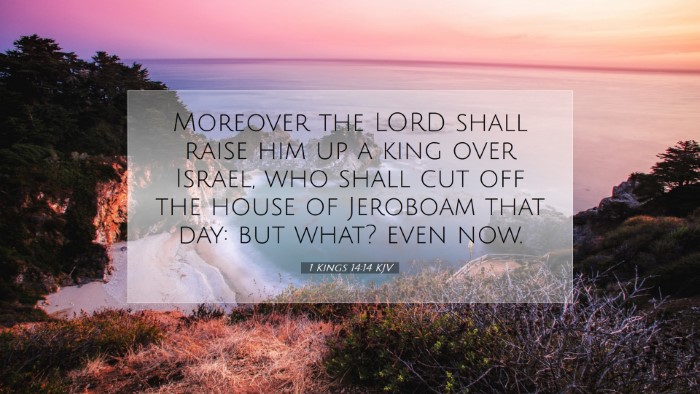Bible Commentary on 1 Kings 14:14
Verse Overview: 1 Kings 14:14 states: "Moreover the LORD shall raise him up a king over Israel, who shall cut off the house of Jeroboam that day: but what? even now." This verse speaks to the divine judgment upon the house of Jeroboam, indicating a forthcoming change in leadership in Israel.
Contextual Background
This verse occurs in the broader context of God’s message to Jeroboam, the first king of the northern kingdom of Israel. After the division of the kingdom, Jeroboam struggled with leading Israel and ensuring the people's loyalty away from the temple in Jerusalem. His actions led to idolatry and rebellion against God, prompting divine intervention.
Insights From Public Domain Commentaries
Matthew Henry's Commentary
Matthew Henry elucidates this verse by emphasizing the sovereignty of God in raising a new king to replace Jeroboam, who had strayed from God’s commandments. Henry points out that God's judgment is inevitable when His commandments are neglected, leading to the downfall of rulers and nations alike.
- Divine Judgment: Henry states that God’s act of removing Jeroboam from leadership is indicative of His control over human affairs.
- God's Faithfulness: The promise of a new king also signifies God's commitment to His covenant with Israel. Despite human failure, God pursues His redemptive plan.
- Warning to Leadership: The passage serves as a caution to all leaders, reinforcing that divine disfavor can lead to their removal from positions of authority.
Albert Barnes' Notes on the Bible
Albert Barnes provides a deeper analysis regarding the prophetic nature of this verse. He asserts that the reference to the new king serves as a prophetic announcement of God’s intention not only to judge Jeroboam but to restore righteousness to Israel.
- Prophetic Closure: Barnes emphasizes that God uses prophetic voices to proclaim imminent change, which offers both hope and a sobering reminder of divine holiness.
- Implications of Leadership: Barnes highlights that leaders are held to a higher standard due to their influence on the people’s spiritual direction.
- Near and Far Fulfillment: The verse reflects both an immediate consequence for Jeroboam and a foreshadowing of a future Davidic restoration, blending immediate historical judgment with eschatological hope.
Adam Clarke's Commentary
Adam Clarke delves into the specifics of the textual implications and historical relevance of this verse. He discusses how the phrase “shall cut off the house of Jeroboam” signifies a complete annihilation of Jeroboam’s lineage due to egregious sins.
- Sovereignty and Justice: Clarke notes that this divine edict indicates that while God is merciful, He is also just, bringing about judgment on ongoing unrepentant sin.
- Significance of Kingship: The establishing of a new king is seen as part of God’s overarching plan for Israel, ensuring that there will always be a remnant faithful to Him.
- Historical Context: Clarke brings to light the historical fulfillments of this judgment, reflecting on the subsequent kings and the eventual decline of Jeroboam’s dynasty.
Theological Reflections
This verse not only conveys a historical event but carries significant theological implications:
- God’s Sovereignty: The narrative reinforces the belief that God maintains sovereignty over nations and leaders, raising and removing them according to His divine will.
- Judgment and Mercy: While judgment indicates a disciplinary action against sin, the promise of a new king symbolizes hope for restoration and divine favor for those faithful to God.
- Legacy of Leadership: The verse serves as a poignant reminder that the actions of leaders resonate through generations, affecting the spiritual state of their people.
Conclusion
1 Kings 14:14 addresses issues of leadership, accountability, and divine judgment in a manner that resonates with contemporary themes in both church and society. For pastors, students, and theologians, this passage speaks to the necessity of fidelity to God's commands and the consequences of straying from His path. Through the insights gleaned from Matthew Henry, Albert Barnes, and Adam Clarke, we are reminded of the weight of leadership and the enduring nature of God’s promises amid human failure.


